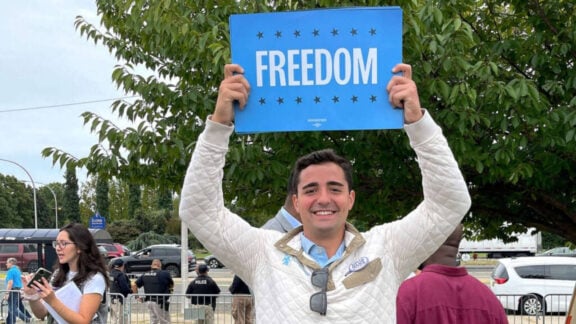Melbourne played host to the NASA Space Apps Hackathon over the weekend, drawing thousands of aficionados in math, technology, and physics to tackle solutions for age-old challenges. This year’s theme focused on the sun, a topic of particular significance to Kostas Siourthas, the founder and CEO of TomorrowX.
Speaking with Neos Kosmos, Siourthas emphasised the deep-rooted connection between space, science, and innovation in Greek civilisation.
“As Greeks, our history is filled with examples of looking beyond what we know to better understand our world and the cosmos,” – Kostas Siourthas CEO of TomorrowX.
“The NASA Space Apps Challenge is a modern way of continuing that legacy—empowering people to solve global challenges by democratizing access to innovation, which is completely aligned with our mission at TomorrowX.”
Funded by NASA’s Earth Science Division, NASA Space Apps is an innovation and public engagement program promoting global collaboration and transparency by sharing openly available data from NASA and its Space Agency Partners with the public. The program includes the NASA International Space Apps Challenge and the NASA Space Apps Collective and encourages global participation in tackling pressing global issues.
Originally from Thessaloniki, Siourthas sponsored the hackathon in partnership with the Australian Space Agency and Amazon Web Services.
TomorrowX, which has pioneered innovation in the tech sector said its founder, “sees this event as a natural extension of the Greek drive to explore and innovate.”
“The X factor of tomorrow is about empowering people and organisations to push beyond today’s challenges and unlock new possibilities,” Siourthas said.
Reflecting on ancient Greek contributions to science, Siourthas mentioned the Antikythera mechanism, which he described as a “marvel of engineering used to track celestial bodies.” He added, “Our culture has always looked towards the heavens.”
The hackathon is truly global – for example, the event’s local lead, Sarah Linley, part of the TomorrowX team, is based in Limassol, Cyprus.
Participants used NASA data to address critical issues such as healthcare, climate change, and food security—challenges that Siourthas believes are timeless.
“The work will have far-reaching effects on life here on Earth and beyond,” he noted.
A panel of experts, including Justin Stark from Accenture, Stephen Rando from ANZ Bank’s Innovation Architecture team, and A/Professor Magdalena Simonis, judged the participants’ solutions.
“The judges use their depth of knowledge to evaluate the creativity, practicality, and potential impact of each solution,” said Siourthas.
For Melbourne’s Greek diaspora, Siourthas said that the event serves “as a reminder of how the Greek culture of exploration continues to inspire and drive global change.”
“The NASA Space Apps Challenge showcases that innovation isn’t confined to experts—it belongs to everyone,” he said.
Siourthas said Neos Kosmos readers should be reminded that the legacy of Greek innovation lives on and urge the Diaspora to carry forward the spirit of discovery and transform today’s challenges into tomorrow’s possibilities.









